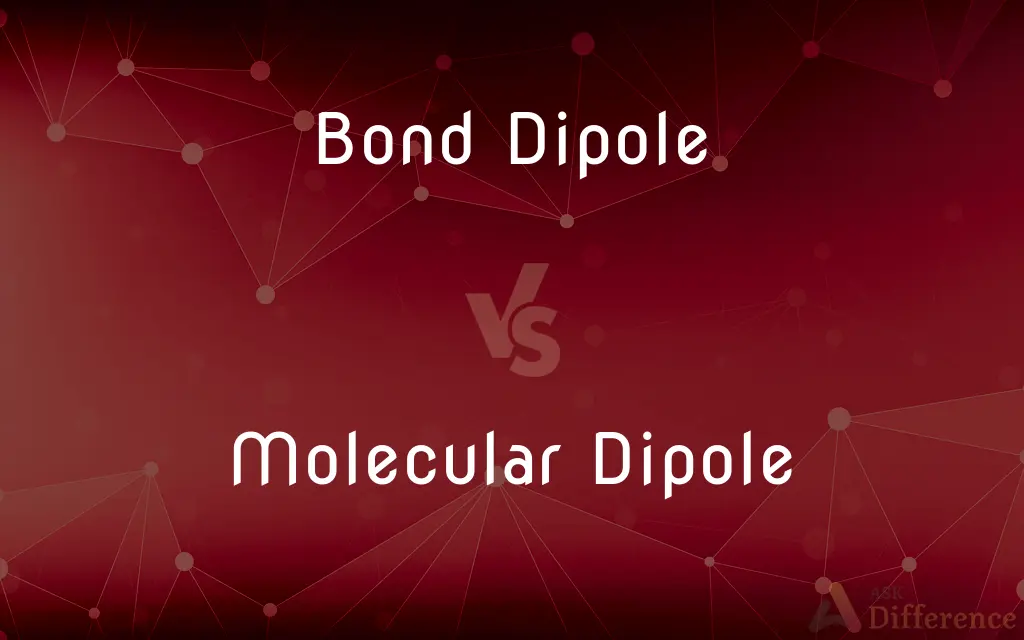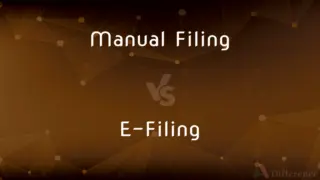Bond Dipole vs. Molecular Dipole — What's the Difference?
By Tayyaba Rehman — Published on October 31, 2023
Bond Dipole refers to the charge separation in a chemical bond between two atoms, while Molecular Dipole is the net dipole moment resulting from all the bond dipoles in a molecule.

Difference Between Bond Dipole and Molecular Dipole
Table of Contents
ADVERTISEMENT
Key Differences
In discussing the nuances of Bond Dipole, it implies the charge separation within a particular bond, generally between two atoms of different electronegativities. Molecular Dipole, on the other hand, is more comprehensive, representing the net dipole moment for the entire molecule, resulting from the vector sum of all individual bond dipoles.
Elaborating further on Bond Dipole, it's pivotal to acknowledge its dependency on the electronegativity difference between two bonded atoms, which drives the electron cloud more towards the more electronegative atom. Whereas, Molecular Dipole encompasses the entirety of the molecule, considering all bond dipoles and their orientations which could either amplify or cancel each other out depending on their vector directions.
In essence, Bond Dipole is an indicator of the polarity within a single bond, showcasing the unequal sharing of electrons between two atoms. On the flip side, Molecular Dipole is a measure that integrates all the bond dipoles within a molecule, taking into account their respective orientations and providing an overall dipole moment for the entire molecule.
The significance of Bond Dipole is generally confined to the individual bond it pertains to, delivering insights regarding its polar nature. Contrarily, Molecular Dipole plays a vital role in predicting the behavior and properties of the molecule in polar solvents, as it implies the overall polarity of the molecule derived from all its bond dipoles.
Furthermore, while Bond Dipole effectively portrays the polarity within a specific bond, it doesn't necessarily dictate the overall polarity of a molecule; a molecule with polar bonds may or may not be polar. Molecular Dipole transcends this, offering a macroscopic perspective by which the overall molecular polarity, and thereby its interactions and solubility in different solvents, can be anticipated.
ADVERTISEMENT
Comparison Chart
Scope
Pertains to a single bond
Pertains to the entire molecule
Dependency
On electronegativity difference of two atoms
On the vector sum of all bond dipoles
Representation
Of the polarity of one bond
Of the overall polarity of a molecule
Influence on Properties
Limited to the specific bond
Influences the properties of the entire molecule
Use
To understand polarity within a bond
To understand overall molecular polarity
Compare with Definitions
Bond Dipole
Vector quantity pointing towards the more electronegative atom.
In H2O, each O-H Bond Dipole points towards the oxygen atom.
Molecular Dipole
The vector sum of all bond dipoles in a molecule.
Water has a net Molecular Dipole due to the orientation of its bond dipoles.
Bond Dipole
A charge separation in a specific bond.
The Bond Dipole in the H-F bond is significant due to the electronegativity difference.
Molecular Dipole
Represents overall polarity of the molecule.
Due to its bent shape, H2O has a significant Molecular Dipole.
Bond Dipole
The difference in electron density between two bonded atoms.
Bond Dipole is evident in the H-Cl bond, causing it to be polar.
Molecular Dipole
The net electric dipole moment in a molecule.
CO2 has a zero Molecular Dipole since its bond dipoles cancel each other out.
Bond Dipole
A result of unequal sharing of electrons in a bond.
Bond Dipoles can be visualized through slightly negative and positive ends.
Molecular Dipole
A determinant of molecular polarity.
BCl3 has a zero Molecular Dipole even with polar bonds, making it nonpolar.
Bond Dipole
The product of charge separation and bond length.
The C=O Bond Dipole in CO2 is strong due to a significant charge separation.
Molecular Dipole
Influences the molecule's interaction with electric fields.
The Molecular Dipole dictates how a molecule interacts in an electric field.
Common Curiosities
Can a molecule have bond dipoles but no Molecular Dipole?
Yes, if bond dipoles in a molecule cancel each other out, it has no net Molecular Dipole.
What is meant by Molecular Dipole?
Molecular Dipole refers to the net dipole moment of the entire molecule, considering all bond dipoles.
Is Bond Dipole always indicative of molecular polarity?
No, a molecule can have bond dipoles without having an overall Molecular Dipole (net polarity).
How does electronegativity relate to Bond Dipole?
Bond Dipole arises due to the difference in electronegativity between two bonded atoms.
What is a Bond Dipole?
A Bond Dipole represents charge separation within a specific chemical bond.
Does Molecular Dipole influence intermolecular forces?
Yes, a Molecular Dipole influences dipole-dipole interactions among molecules.
Can a molecule with nonpolar bonds have a Bond Dipole?
Typically no, as bond dipoles arise from polar bonds, which exhibit a difference in electronegativity.
Can Molecular Dipole impact a molecule’s behavior in a solvent?
Yes, a substantial Molecular Dipole can lead to higher solubility in polar solvents.
Is Molecular Dipole a vector quantity?
Yes, Molecular Dipole is a vector, considering both magnitude and direction of all bond dipoles.
Is Molecular Dipole related to the molecule’s geometry?
Absolutely, the spatial arrangement of atoms (geometry) significantly influences the net Molecular Dipole.
How does bond length affect Bond Dipole?
Bond Dipole is directly proportional to bond length: larger bond length can increase bond dipole.
Is the direction of a Bond Dipole significant?
Yes, it points from the positive to the negative end, or towards the more electronegative atom.
How is the Molecular Dipole determined in a symmetrical molecule?
In symmetrical molecules, the bond dipoles often cancel each other, resulting in a zero Molecular Dipole.
Can Bond Dipoles impact molecular shape?
No, Bond Dipoles don’t impact shape but are influenced by it due to electronegativity and atomic arrangement.
Can a molecule’s overall polarity be predicted by Bond Dipole alone?
No, Molecular Dipole, which considers all bond dipoles and their arrangement, predicts overall polarity.
Share Your Discovery

Previous Comparison
Inertia vs. Moment of Inertia
Next Comparison
Manual Filing vs. E-FilingAuthor Spotlight
Written by
Tayyaba RehmanTayyaba Rehman is a distinguished writer, currently serving as a primary contributor to askdifference.com. As a researcher in semantics and etymology, Tayyaba's passion for the complexity of languages and their distinctions has found a perfect home on the platform. Tayyaba delves into the intricacies of language, distinguishing between commonly confused words and phrases, thereby providing clarity for readers worldwide.














































